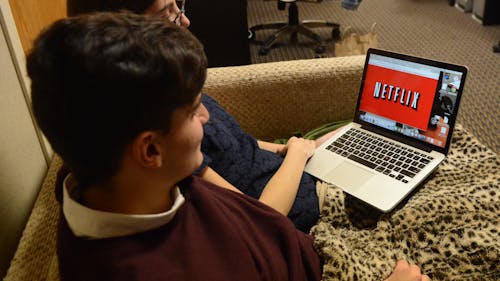'Cuffing season' has basis in scientific data, Rutgers professor says

With temperatures dropping and the holiday season commencing, “cuffing season” has arrived at Rutgers. Recent studies suggest that this social media trend might stem from biological and societal influences.
Cuffing season refers to the colder winter months from the end of November to the beginning of March, when students typically seek out serious relationships. Known as a millennial fad and trending hashtag, science suggests this may be the closest thing humanity experiences to a mating season.
Stephen Kilianski, a teaching instructor in the Department of Psychology, said coupling is more likely to occur in the winter to combat the depression brought on by Seasonal Affective Disorder (SAD).
“When there’s less sunlight that results in hormonal changes in the brain that can lead to depression or at least more negative feelings,” he said. “Bonding closely with another person can help to relieve those kinds of feelings.”
Though humans mate year-round, Kilanski said it seems reduction in sunlight is a factor in people’s increased desire to find a partner to bear the cold weather with.
Kilianski said when an individual forges a relationship with another person, it is mutually rewarding for a number of reasons.
Oxytocin, known as the “hugging or coupling hormone,” is released when a person forms intimate bonds with another person, often through physical contact, Kilianski said. This could possibly serve as an individual’s solution to avoid negative feelings brought on by Seasonal Affective Disorder and follow this heightened urge for companionship.
In places around the world with longer and more abrasive winters, Kilianski said people experience a prolonged sense of finding a mate year-round rather than seasonally.
“That would be a fascinating thing to look at if this trend is more likely to occur in places like the Scandinavian countries where in the winter they get almost no sun," he said. "Maybe cuffing season does not occur altogether around the equator because people there get basically the same amount of sunshine year-round.”
Aside from the biological drive to seek a mate, societal norms also have an influence on the desire to find a partner around the colder months.
A large expectation to have a significant other during the holiday season may lead to stress in young, single adults returning home, Kilianski said.
“You internalize these norms to a certain extent and believe you should be coupled or paired up with somebody and may even feel a little bit deficient and inadequate when you’re not,” he said. “These norms are driven home to you more so than they would be at any other point in the year.”
Raj Shah, an Ernest Mario School of Pharmacy first-year student, has had firsthand experience with the pressure to partake in cuffing season.
“I think there definitely is pressure to bring home a boyfriend or girlfriend during the holidays, whether you’re just trying to avoid the questioning of your parents about why you’re still single, or maybe even just to get out of awkward conversations with your family,” Shah said.
In addition, there are fewer chances to meet potential partners during winter months compared to the spring and summer, which have a larger amount of recreational activities and group gatherings, according an article by Washington Post.
While relationships forged during cuffing season are notoriously short-lived, not all of them are necessarily doomed to fail, said Shannon McIntyre, a School of Arts and Sciences first-year student.
“I feel like cuffing season, the culture in general of universities, is that people only want to be together for a certain time or are looking solely for a hookup,” McIntyre said. “As long as you communicate your feelings though, there’s no reason for your relationship to have a termination date.”



